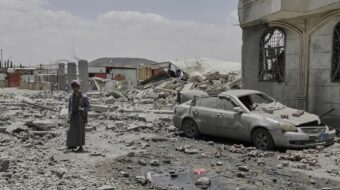“It’s all for nothing; that war could have been prevented,” Michelle Waters, sister of Staff Sgt. Kendall Waters-Bey, one of the first U.S. casualties of the Iraq war, said, tears running down her cheeks.
“Now, we’re out of a brother. [President] Bush is not out of a brother. We are.”
Kendall Waters-Bey, a 29-year-old African American Marine and father of a 10-year-old boy, was among 12 servicemen – eight British commandos and four U.S. Marines – who died March 20 when their helicopter crashed and burned about nine miles south of Umm Qasr, near the Kuwait border.
“Man, I’m devastated,” said Michael Waters-Bey, the Marine’s father, who received the news every parent of a serviceman at war dreads about 3 a.m. March 21. “He was my only son, my oldest child.”
The father said his son had joined the Marines because “he wanted to get away from being on the streets. He wanted to do something positive to take care of his son.”
As Bush’s war neared the one-week mark, it was clear that the attack was not going according to Washington’s script: a quick “clean” takeover, opposition rapidly caving in, invading troops welcomed as liberators. At press time, the Pentagon had acknowledged 20 U.S. troops killed and 14 captured or missing in the first six days of war. The dead Americans ranged in age from 19 to 36, from cities and towns across the nation.
“These kids didn’t enlist because they wanted to further Bush’s grandiose schemes or Cheney’s oil-Halliburton interests,” Vietnam veteran Barry Romo told the World. “They wanted a chance to do some good, and to get some education and a job.”
Romo, a national coordinator of Vietnam Veterans Against the War, served 10 and a half months in Vietnam, a lieutenant commanding an infantry platoon. Romo’s nephew was killed during the Tet offensive. “I brought him home in a body bag,” he said softly. “Supporting our troops means bringing them home alive.”
The Pentagon claimed hundreds of Iraqi soldiers had been killed, with reports starting to sound like the notorious Vietnam War body counts, when numbers of “enemy” killed were used by U.S. military brass to measure progress in that war.
At the same time, the number of Iraqi civilian casualties is rising.
A U.S. cruise missile attack in Baghdad, March 26, killed 15 Iraqi civilians and injured 30 in a crowded working-class neighborhood, as President Bush praised the “lethal precision” of American bombs and cruise missiles. Associated Press television showed a large crater in the middle of a street, a child with a head bandage, and bodies wrapped in plastic sheeting in a pickup truck. Reuters counted 15 scorched corpses lying amid blackened cars and rubble from broken buildings. Residents pulled a man with a bloody head from rubble and said a pregnant woman was among the dead.
U.S. Iraq Peace Team members who visited Baghdad hospital trauma centers said hundreds of wounded and maimed patients had been treated over the previous five days.
Fatima, 10, suffered multiple fractures when a wall collapsed. Her father, a farm laborer, said, “We are like brothers and sisters to people in the United States. We don’t attack American people. Please give this message to American people. This is an invasion, it has nothing to do with democracy.”
Hosam Khaf, 13, fled his apartment with his family when huge bombs exploded nearby, miles from any military facilities. He was hit in the abdomen by shells and now has a colostomy bag. His father said, “Most of the casualties are children, elderly people and civilians. What do they have to do with fighting and war?”
The U.S.-led assault has run into numerous setbacks. These include the failed initial attempt to kill Saddam Hussein and other top Iraqi leaders, and resistance from Iraqi fighters in the south, using guerrilla tactics and ordinary rifles to shoot down helicopters and damage tanks. U.S. and British generals have been forced to switch much of their efforts to street-fighting in southern Iraqi cities. Also, sandstorms are slowing their advance on Baghdad and making air operations difficult if not impossible.
Although Iraq’s alleged possession of chemical or biological weapons has been one of Bush’s key justifications for war, so far no such weapons have been found by U.S.-British forces or used against them by Iraq. U.S. officials are lowering expectations that banned weapons will be found quickly.
Despite these difficulties, the U.S., with its overwhelming might, is widely expected to end up winning a military victory in Iraq. The question right now is: at what cost? Other questions follow: Who benefits? And what happens after such a “victory”?
The author can be reached at suewebb@pww.org
PDF version of ‘In Iraq, casualties mount on both sides’










